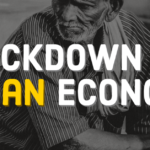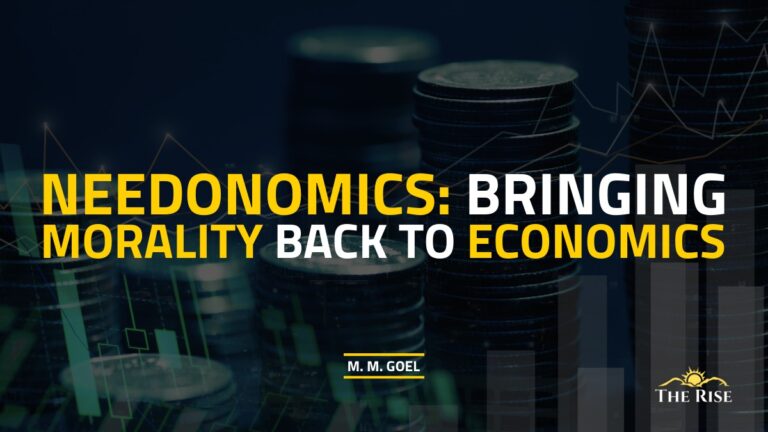The global citizenry has to accept the realities of the economic crisis in terms of slow growth rate and recession in the global economy. Is there any mantra to fix the problems in the global economy, especially India? What should we do to come out of the impact of the COVID-19 crisis and revive the economy? It is imperative to look for the path of revival for the global economy.
‘Needonomics‘ could be the smooth path of survival and revival of the global economy.
As a Needonomist, I fully believe that ‘Needonomics‘ (economics of needs) would be the smooth path of survival and revival of the global economy in the post-COVID era.
Also Read: Villages: The New Wheels of Economy in Post-Pandemic World
Needonomics, based on Bhagavad Gita, represents the ‘Idea of India’, which is nonviolent, ethical, spiritual and confines itself to the needs. In contrast to greedonomics (economics of greed), it opposes greed and authenticates the economic thoughts of Mahatma Gandhi to a great extent. It counters most of the problems caused by Greedonomics, including violence, terrorism, exploitation, deprivation, discrimination, discontent and corruption of all kinds prevailing in the society. Endless greed is at the core of most of the problems faced by the world today.
Also Read: Lockdown in Indian Economy
To implement the principle of ‘Needonomics’, the strategy of spiritually guided materialism (SGM) will be useful. For example, the slogan ‘yogakshemam vahamyaham’ meaning “Your welfare is our responsibility” is derived from sloka 22 of chapter 9 of Bhagavad Gita –
“ananyāśh chintayanto māṁ ye janāḥ paryupāsate teṣhāṁ nityābhiyuktānāṁ yoga-kṣhemaṁ vahāmyaham”.
It means that “There are those who always think of Me and engage in exclusive devotion to Me. To them, whose minds are always absorbed in Me, I provide what they need and preserve what they already possess”
Also read: Resuscitating Migrant Workers to Economy
Recession in the global economy needs to be accepted by all the stakeholders in an economy. It requires proper diagnosis by the economists of all shades and creed with Gita’s wise words of wisdom to create a conducive climate and work culture with the honesty of purpose. It needs to be understood that spiritualism and materialism are complementary to each other and not substitutes. To mitigate the miseries of materialism, modern economics must consist of spiritualism which is, both, necessary and sufficient for the ethical behaviour of the economic actors like consumers, producers, distributors, traders, and, above all, the policymakers and facilitators. Economists have a unique responsibility towards the moral empowerment of all the actors in the economy.
Also Read: Liquor as Cash Cow for Financing
The consumer is a hero of economics. All those who pollute the relationship are called villains in the real drama in the market. Everyone is a consumer and is expected to behave in the market with rational behaviour.
Economics should be based on need, not on greed.
Consumer psychology is the study of why and how people buy things in the market (online and offline). Every consumer should consume goods and services as per their needs. It is unfortunate that leading economists of the world promote greed as the basis of economic growth, turning it into a “Greedonomics”. Economics should be based on need, not on greed.
Also Read: Poverty Alleviation: An imperative for sustainable development
For the revival of the economy, we need smart citizenry as consumers, producers, distributors, and traders. A SMART person is simple, moral, action-oriented, responsive and transparent.
SIMPLE model of empowerment consists of six human developments such as spiritual quotient development, intuition development, mental level development, love oneself attitude development, and emotional quotient development.
We have to adopt the SIMPLE model of empowerment consisting of six human development activities such as spiritual quotient (SQ) development, intuition development, mental level development, love oneself attitude development, and emotional quotient (EQ) development. The synergy of these six aspects is an essential requirement for us to emerge and realize our full potential.
Also Read: World Economic Situation And Prospects: January 2020 …
My perceptions about COVID-19 led economic crisis is to understand, analyze, and interpret globalization as internationalization of Indianization which I have been promoting since 1991.
To implement the vision of ‘Atamnirbhar Bharat Abhiyan‘ announced by Indian Prime Minister, avoid overemphasizing ‘vocal for local’. Also, be a little diplomatic and use the wisdom for ‘Glocalization’ meaning thereby think globally and act locally for promoting the idea of Vasudhiava Kutumbakam (the world is one family).
Use the wisdom for ‘Glocalization’ meaning thereby think globally and act locally for promoting Vasudhiava Kutumbakam.
To justify the relevance of needonomics in the present COVID-19 crisis, accept and understand Bhagavad Gita for welfare economics and management. It needs to be accepted as a Sacro-secular epic for the entire humanity. The economy can be people friendly and socially beneficial only if it follows the NAW approach (Need, Affordability, Worth of the goods and services). The pertinent questions before the people ‘Does one need the good or service, which has been so glamorously advertised? Is the good or service affordable? Is the good or service worth its price?’ The market should satisfy the essential needs of the people, create employment opportunities, and be utilitarian.
Efficacy and esteem should be the belief to shape the economy which calls for zealous human resources with spiritual input.
We have to understand, analyze, interpret, and adopt the NAW approach for the goods and services. To create work culture, there is a need for converting holiday culture into holy-day culture. I firmly believe that the rate of progress in spiritualism is faster than the rate of progress in materialism. Therefore, there is a need for accepting spiritually guided materialism (SGM) which is nonviolent, ethical, and spiritual. Efficacy and esteem should be the belief to shape the economy which calls for zealous, rather than jealous, human resources with spiritual input. To make it happen we should adopt an evolutionary approach and should not expect miracles.
Also Read: Introspecting the COVID-19 Lockdown in India
I believe an enlightened life helps in developing skills, values, wisdom, and vision to align and harmonize new connectivity among various economic sectors in the global society. Gita is useful to all those who are interested in exploring such a journey to life, living, and providing leadership driven by nobler objectives for reviving the global economy.
Disclaimer: The views expressed in this article are of the author solely. TheRise.co.in neither endorses nor is responsible for them.
About the author
Prof. Madan Mohan Goel, Former Vice Chancellor and Propounder of Needonomics School of Thought.






































Pingback: GST and Governance in India - TheRise.co.in - M M Goel
Pingback: Introspecting Transparent Taxation- Honouring the Honest